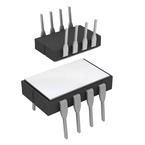●Product Details
●The AD8229 is an ultralow noise instrumentation amplifier designed for measuring small signals in the presence of large common-mode voltages and high temperatures.
●The AD8229 has been designed for high temperature operation. The process is dielectrically isolated to avoid leakage currents at high temperatures. The design architecture was chosen to compensate for the low V
●BE voltages at high temperatures.
●The AD8229 excels at measuring tiny signals. It delivers industry leading 1 nV/√Hz input noise performance. The high CMRR of the AD8229 prevents unwanted signals from corrupting the acquisition. The CMRR increases as the gain increases, offering high rejection when it is most needed.
●The AD8229 is one of the fastest instrumentation amplifiers available. Its current feedback architecture provides high bandwidth at high gain, for example, 1.2 MHz at G = 100. The design includes circuitry to improve settling time after large input voltage transients. The AD8229 was designed for excellent distortion performance, allowing use in demanding applications such as vibration analysis.
●Gain is set from 1 to 1000 with a single resistor. A reference pin allows the user to offset the output voltage. This feature can be useful when interfacing with analog-to-digital converters.
●For the most demanding applications, the AD8229 is available in an 8-lead side-brazed ceramic dual in-line package (SBDIP). For space-constrained applications, the AD8229 is available in an 8-lead plastic standard small outline package (SOIC).
●The AD8229 is also available as Known Good Die
●Applications
● Down-hole instrumentation
● Harsh environment data acquisition
● Exhaust gas measurements
● Vibration analysis
●### Features and Benefits
● Designed for 210°C operation
● Low noise
●1 nV/√Hz input noise
●45 nV/√Hz output noise
● High CMRR
●126 dB (min) at G = 100
●80 dB (min) to 5 kHz, G = 1
● See data sheet for additional features
● Download AD8229-KGD Data Sheet.
● Available As Known Good Die and fully guaranteed to data sheet specifications.



